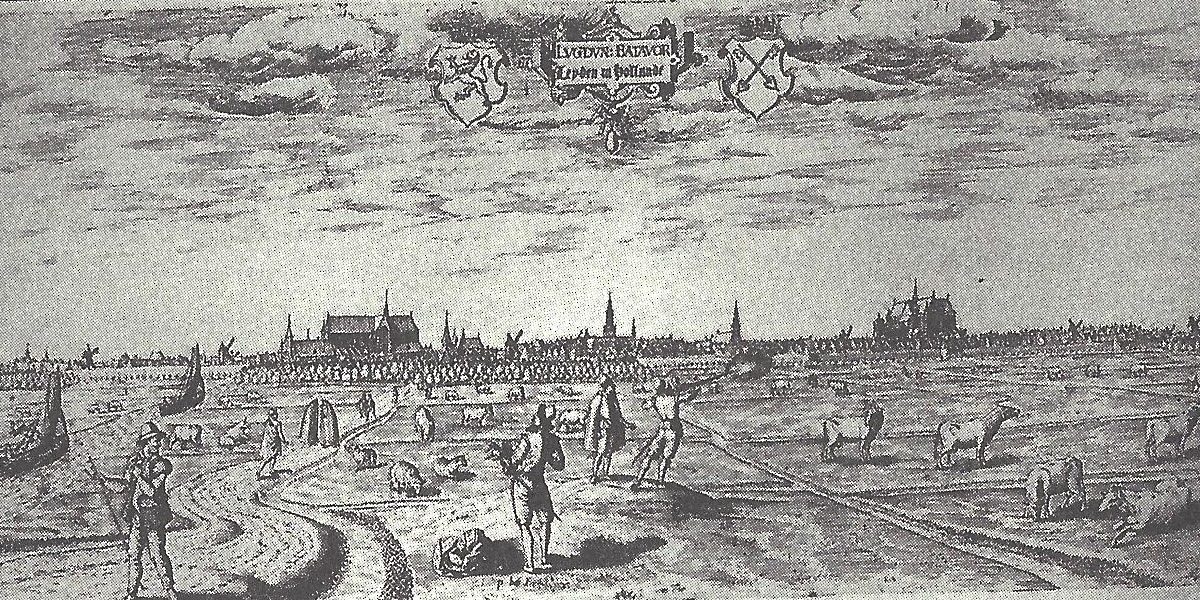Upon their departure from Leiden in the Speedwell, Bradford relates “So they left that goodly and pleasant city which had been their resting place near twelve years; but they knew they were pilgrims, and looked not much on those things, but lift up their eyes to the heavens, their dearest country, and quieted their spirits.”
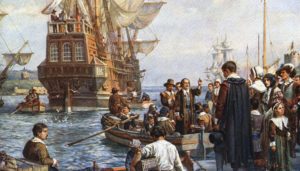 We know that of the hundred or so passengers on the Mayflower, about two-thirds had been members either of the Leiden congregation or had earlier belonged to a variety of separatist communities or churches in England. The remaining third of the passengers may have joined the group at Southampton, England after the Speedwell arrived from Delfshaven, Holland. Most must have shared some of the same religious beliefs held by those who had just spent a decade in the Netherlands with at least some degree of reformed theology.
We know that of the hundred or so passengers on the Mayflower, about two-thirds had been members either of the Leiden congregation or had earlier belonged to a variety of separatist communities or churches in England. The remaining third of the passengers may have joined the group at Southampton, England after the Speedwell arrived from Delfshaven, Holland. Most must have shared some of the same religious beliefs held by those who had just spent a decade in the Netherlands with at least some degree of reformed theology.
As Edward Winslow reported at the time they planned to depart, “They that stayed at Leiden feasted us that were to go at our pastor’s house, it being large; where we refreshed ourselves, after tears, with singing of Psalms, making joyful melody in our hearts as well as with the voice, there being many of our congregation very expert in music; and indeed it was the sweetest melody that ever mine ears heard.”
Pastor John Robinson’s farewell sermon was probably preached in Leiden around July 20 (old style calendar; or July 30 new style). Many of the families were about to be separated (husband, wife or children) though all hoped to be rejoined in the future. Think of it, a remnant of a well settled congregation sent into the wilderness as a church plant, prepared to govern themselves, and going without their pastor. Reported by Edward Winslow, his sermon had some of these remarks:
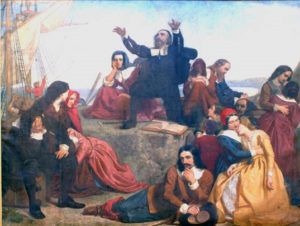 We are now ere long to part asunder, and the Lord knoweth whether ever he should live to see our faces again…. he charged us before God and his blessed angels, to follow him no further than he followed Christ; and if God should reveal anything to us by any other instrument of his, to be as ready to receive it, as ever we were to receive any truth by his ministry; for he was very confident that the Lord had more truth and light yet to break forth out of his holy word. He took occasion also miserably to bewail the state and condition of the Reformed churches who were come to a period in religion and would go no further than the instruments of their reformation.
We are now ere long to part asunder, and the Lord knoweth whether ever he should live to see our faces again…. he charged us before God and his blessed angels, to follow him no further than he followed Christ; and if God should reveal anything to us by any other instrument of his, to be as ready to receive it, as ever we were to receive any truth by his ministry; for he was very confident that the Lord had more truth and light yet to break forth out of his holy word. He took occasion also miserably to bewail the state and condition of the Reformed churches who were come to a period in religion and would go no further than the instruments of their reformation.
These are statements from a truly humble pastor. He started no movement with his name on it. He did not demand loyalty to him, but only loyalty to Christ. He exhorted each one to receive truth directly from God’s Word. Each individual was responsible to maintain their flame of devotion to Christ.
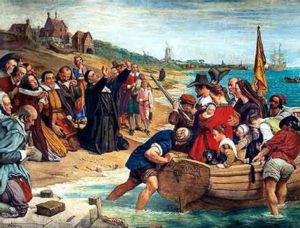 “As for example, the Lutherans, they could not be drawn to go beyond what Luther saw; for whatever part of God’s will he had further imparted and revealed to Calvin, they will rather die than embrace it. And so also, saith he, you see the Calvinists, they stick where he left them, a misery much to be lamented; for though they were precious lights in their times, yet God had not revealed his whole will to them; and were they now living, saith he, they would be as ready and willing to embrace further light, as that they had received.”
“As for example, the Lutherans, they could not be drawn to go beyond what Luther saw; for whatever part of God’s will he had further imparted and revealed to Calvin, they will rather die than embrace it. And so also, saith he, you see the Calvinists, they stick where he left them, a misery much to be lamented; for though they were precious lights in their times, yet God had not revealed his whole will to them; and were they now living, saith he, they would be as ready and willing to embrace further light, as that they had received.”
Though Pilgrim theology was Reformed, they did not bear the label of Calvinist, Lutheran or any other reformer, but were simply to be known as followers of Christ, for as Robinson noted: “…He put us in mind of our church covenant… exhorted us to take heed what we received for truth, and well to examine and compare it and weigh it with other Scriptures of truth before we received it. For saith he, it is not possible the Christian world should come so lately out of such thick antichristian darkness, and that full perfection of knowledge should break forth at once.”
Bradford then records that they went to Delftshaven where “the ship and all things ready, and such of their friends as could not come with them followed after them, and sundry also came from Amsterdam to see them shipped andd to take leave of them. That night was spent with little sleep by the most, but with friendly entertainment and Christian discourse and other real expressions of true Christian love.”
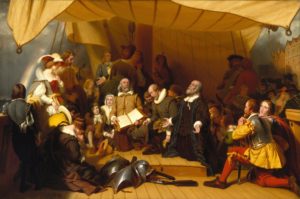 “The next day… they went aboard and their friends with them, where truly doleful was the sight of that sad and mournful parting, to see what sighs and sobs and prayers did sound amongst them, what tears did gush from every eye, and pithy speeches pierced each heart; sundry of the Dutch strangers that stood on the quay as spectators could not refrain from tears. Yet comfortable and sweet it was to see such lively and true expressions of dear and unfeigned love. But the tide, which stays for no man, calling them away that were thus loath to depart, their reverend pastor falling down on his knees (and they all with him) with watery cheeks commended them with most fervant prayers to the Lord and His blessing. And then with mutual embraces and many tears they took their leaves one of another, which proved to be the last leave to many of them.”
“The next day… they went aboard and their friends with them, where truly doleful was the sight of that sad and mournful parting, to see what sighs and sobs and prayers did sound amongst them, what tears did gush from every eye, and pithy speeches pierced each heart; sundry of the Dutch strangers that stood on the quay as spectators could not refrain from tears. Yet comfortable and sweet it was to see such lively and true expressions of dear and unfeigned love. But the tide, which stays for no man, calling them away that were thus loath to depart, their reverend pastor falling down on his knees (and they all with him) with watery cheeks commended them with most fervant prayers to the Lord and His blessing. And then with mutual embraces and many tears they took their leaves one of another, which proved to be the last leave to many of them.”
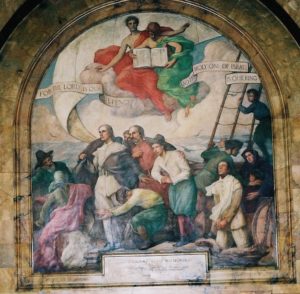 As the mural depicting the Pilgrims in prayer on the Mayflower in the Massachusetts State House declares: “God sifted a whole nation that he might send choice grain into this wilderness.” We now honor the 400th anniversary of the Embarkation from Holland of these Pilgrim exiles, “choice grain” on their journey of faith.
As the mural depicting the Pilgrims in prayer on the Mayflower in the Massachusetts State House declares: “God sifted a whole nation that he might send choice grain into this wilderness.” We now honor the 400th anniversary of the Embarkation from Holland of these Pilgrim exiles, “choice grain” on their journey of faith.
Those who are believers and see themselves as pilgrims on the journey of faith can identify with God who calls us all “pilgrims” (Hebrews 11:13). We can also identify with Bradford at this time in history when he declared: “It was answered, that all great and honorable actions are accompanied with great difficulties and must be both enterprised and overcome with answerable courages. It was granted the dangers were great, but not desperate. The difficulties were many, but not invincible…. And all of them, through the help of God, by fortitude and patience, might either be borne or overcome.

